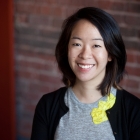GINA HOTTA, a community activist and award-winning journalist, passed away September 28 at the age of 56. Hotta, also a musician and avid jazz fan, wrote about the connection between South Asians and jazz for this issue, her first article for Hyphen. From her involvement in San Francisco State University’s 1968 Third World Student Strike to mentoring countless young, community-minded journalists, Hotta never stopped her quest to give voice to those who needed it most. After 9/11, Hotta recognized this purpose with new urgency; in 2001 she founded APEX Express, a progressive weekly radio show on Berkeley, CA-based KPFA . The show, which she also co-hosted and produced, focuses on news and culture from Asian Pacific Islander points of view. Characterized by many as a humble warrior, Hotta’s devotion to empowering the underserved in our community through journalism continues to inspire the Hyphen staff.
A funny thing happened to AKITO YOSHIKANE while perusing his favorite Asian American blogs: He was bombarded with auto-generated ads for Asian dating services. “Discussions of race have typically centered around human interaction,” the New York City writer said. “But now that computer programs can somehow perpetuate racial stereotypes, I think technology has to be included in the dialogue, too.” Part of the problem, Yoshikane has learned, is the lack of marketing toward Asian Americans. “The absence of ethnic-specific marketing has spurred these insensitive ads to fill a void that has yet to be filled in advertising.” Who does he consider to be a trailblazer? The Mountain Brothers, a Chinese American rap trio from the mid-1990s.
Brooklyn, NY-based GABRIELA HERMAN kept it all in the family for her portrait of director/screenwriter Tze Chun: Not only did she enlist her brother to assist with the shoot on Manhattan’s High Line, but a week later, she photographed Chun’s sister, a dancer. Herman also discovered that she and Chun grew up nearby each other outside of Boston. “A lot of my photography is about the relationship that forms between photographer and subject in the moments behind the lens,” said Herman, whose work has appeared in Time Out New York, Edible Manhattan and Metro Newspaper. Her idea of a trailblazer? Newark, NJ, Mayor Cory Booker. “As a young African American mayor, he is making great strides for the city and inspiring those around him.”
Toronto-based CHU ZHANG defines a trailblazer as someone like artists Jillian Tamaki and Yuko Shimizu, fellow illustrators who infuse their cultural roots into their work yet still garner mass appeal. “I try to do the same, showing my personal roots while speaking in a voice that everyone can understand.” For this issue’s comic, her first to be published, Zhang crafted a short narrative based loosely around a theme of fall. “The story I’ve made is about change, unfulfillment and lost youth. Honestly, not as depressing as it sounds.”
While reporting on some of today’s trailblazers — Asian Americans in the Obama administration — for this issue’s Features section, PRIYA GANAPATI was impressed by how much the Obama campaign galvanized Asian American community leaders — and by how many are retaining their enthusiasm now that they are in the White House. “The level of idealism surprised me. I expected them to be more jaded and cynical about the process and their role, but they really want to make a difference.” San Francisco-based Ganapati writes about technology for Wired.com and has also worked with TheStreet.com, Red Herring and CNET India.
While working on illustrations to accompany this issue’s trio of Lazy Susan stories,
SYLVIA PARK found Nichole Y. Wong’s story about Asian American life coaches to be particularly resonant. “I had jobs where it was so hard for me to engage and communicate with my co-workers,” said Park, who is based in New York. “I’ve also seen a lot of Asian Americans who are so talented but struggle much more to advance.” Park has worked for The Washington Post, Time Out New York and O, The Oprah Magazine and hopes to someday witness an Asian American blaze a trail to the White House. “We now have an African American president and were close to seeing a female president. Why not Asian American?”
mimi lok’s story in this issue’s Fiction section was inspired by an article about young couples in Hong Kong who make regular trips to seedy “love hotels” in order to gain some privacy. But her protagonists ended up being “a different kind of couple in a different kind of hotel, and sex isn’t necessarily their main preoccupation,” said lok, whose work has appeared in The Washington Post, USA Today and Time Out London. Lok considers Hu Shuli, the crusading founding editor of Beijing-based Caijing magazine who was dubbed the “most dangerous woman in China,” to be the definition of a trailblazer.
DUNG HOANG expanded his repertoire beyond doing photomontage and mixed media for nonfiction articles to create the illustration for this issue’s Fiction selection. His process included research on chandeliers and Thai-style resort rooms, as well as imagining the appearance and demeanor of the story’s main character. He then immediately set to work sketching the scene: “I work very quickly and try to let the spontaneity of the moment reveal itself.” The Salt Lake City artist’s work has appeared in Esquire, GQ, Men’s Health and The New York Times.







Comments